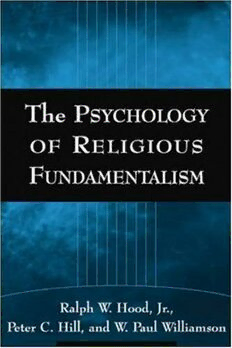
The Psychology of Religious Fundamentalism PDF
255 Pages·2005·1.109 MB·English
Most books are stored in the elastic cloud where traffic is expensive. For this reason, we have a limit on daily download.
Preview The Psychology of Religious Fundamentalism
Description:
This book presents a new psychological framework for understanding religious fundamentalism, one that distinguishes fundamentalist traditions from other faith-based groups and helps explain the thinking and behavior of believers. Steering clear of stereotypes, the highly regarded authors offer respectful, historically informed examinations of several major fundamentalist groups. Focusing primarily on Protestant sects, including the Church of God (a Pentecostal denomination), the serpent handling sects of Appalachia, and the Amish, the book also discusses Islamic fundamentalism. Addressed are such key themes as the role of the sacred text within fundamentalism; how beliefs and practices that many find difficult to comprehend actually fit into coherent meaning systems; and how these meaning systems help meet individuals' needs for purpose, value, and self-worth.
See more
The list of books you might like
Most books are stored in the elastic cloud where traffic is expensive. For this reason, we have a limit on daily download.
